
Last September I had the chance to do a series of AI-related speaking engagements in Atlanta (one of those presentations became one of our most popular articles on “enterprise AI adoption”), but unlike most trips, I spent very little time in the hotel.
Little did I know I’d be hurled into over a dozen of one-to-one meetings with AI execs and researchers from all over the Atlanta area over the course of my week-long stay – collecting enough insight and perspective to put together a much bigger article about the Atlanta AI scene.
After the popularity of our “AI in Boston” and “AI in Montreal” articles, I decided to pull together a set of perspectives on the Atlanta AI ecosystem, with the goal of answering the following questions:
- How much traction does artificial intelligence have in the Atlanta business/startup scene now?
- What factors make Atlanta appealing (or unappealing) as a place to start a company?
- In what industries does Atlanta have an advantage for AI innovation?
The article below is broken out into the following five sections:
- How the focus on AI has changed the Atlanta tech scene in the last 3 years
- The advantages of Atlanta as a tech and AI hub
- The disadvantages of Atlanta as a tech and AI hub
- How Atlanta’s local culture influences startup life
- The unique industries where Atlanta has a business advantage
In all of the following sections below, I lay out some of the quotes collected from local AI experts and business leaders, and then lay out my own assessment and synopsis on the same topic:
How the Focus on AI has Changed the Atlanta Tech Scene in the Last 3 Years
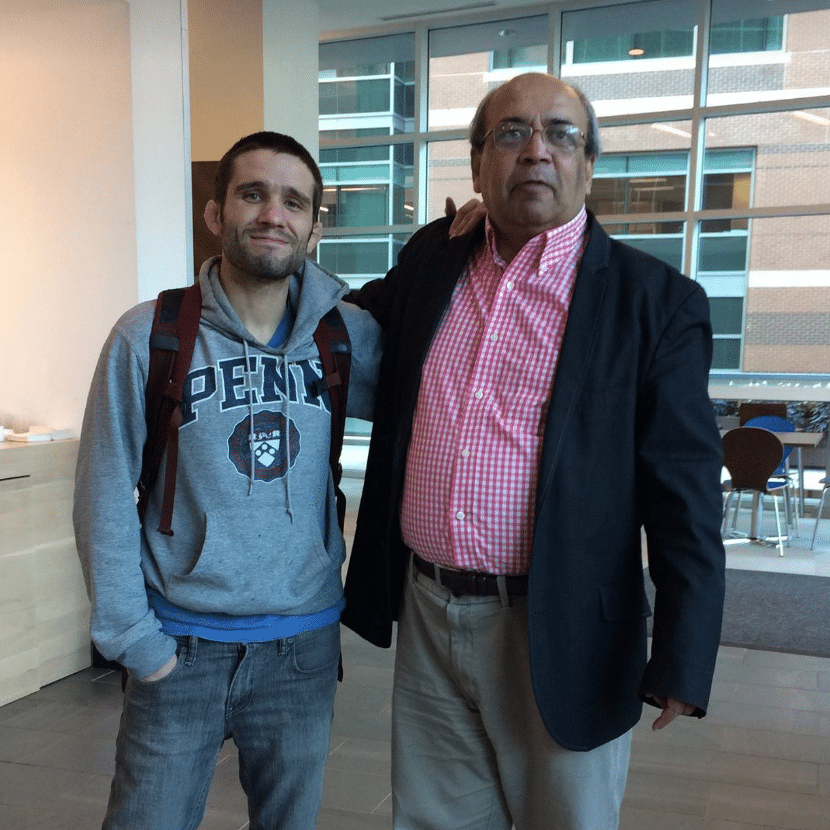
Will McGinnis, Chief Scientist at Predikto:
As projects have started to “leave the lab”, we’ve seen a big increase in focus on topics like fairness, interpretability, audibility, and in general just understanding the models themselves.
I think branching out from the “black-box” mentality is going to help dramatically with adoption in new applications where trust or safety matters (autonomous vehicles, heavy industry, logistics, etc.), which I think are areas of huge opportunity. I’m not sure there is really a downside to it, other than perhaps opportunity cost, but one that I think is well worth it.
Nikolaos Vasiloglou founder of MLTrain:
AI lowered the barrier for working with images, text and speech, which I was avoiding because of the startup cost (initial investment in reading and hardware). Because of the impressive results a lot of people moved into that domain (which is not congested) and left a gap in traditional datascience.
The “fashion” wave of datascience was too short and there are still a lot of problems unsolved and not too many people working on them anymore. Now I feel I have more time and less pressure on working on traditional problems like automated data cleaning and automatic schema recognition (relational feature generation) that modern AI can help me solve.
This might not look as sexy as the self driving car, but it has a great value proposition. Also traditional shallow models can be improved by using logical constraints and adversarial training (both ingredients of modern AI). In modern AI techniques can make sure that the model is learning the right thing!
Matt Rushing, Vice President, Product Line, Global Crop Care, AGCO:
What kicked it off for us is… as the population has grown we need to be more productive for every farm… the amount of land and water available for agriculture is shrinking… so how do we use the technology to produce more?
Thre’s also the need to improve our own operations… but increasing yields and reducing waste for farmers is the big push…
There are a lot more companies here, there are a lot more tech incubators… the cities and communities around Atlanta are seeing some of this, too. It’s focused on a lot of different activities, around all kinds of technologies in the ag-tech space.
Lots of focus is being applied to what can be done with just a smartphone – how to determine a kind of week, or count the kernels on an ear of corn.
Corbett Gilliam, Corporate Development Manager, ATDC:
In the Georgia Tech community, the most recent excitement around AI came from Professor Ashok Goel developing an AI Teaching Assistant for his Artificial intelligent class in 2016. (Link: http://www.news.gatech.edu/2016/05/09/artificial-intelligence-course-creates-ai-teaching-assistant) Throughout an entire semester, the class had 6 teaching assistants who answered questions digitally; 5 humans and 1 AI.
The classroom of students claimed that Jane Watson, the AI Teaching Assistant, was the best of the 6. They were all shocked when the professor told them she was an AI on the last day of class.
These technological advancements bring about promise of efficiencies and value creation, while they also accelerate the pace of creative destruction.It is always important to foresee and prepare for the job displacements as our economy shifts at quicker rate, yet it is important to spearhead technological advancements and continue to develop our economy.
Ashok Goel, Professor, Georgia Tech:
Artificial Intelligence is in vogue again. AI is almost as hot now as it was in the mid-1980s when I started working in the field. It is great to see the energy and the excitement. Of course, all this attention is also sometimes accompanied with exaggerations and false alarms.
Larry Lafferty, President and CEO of Veloxiti, Inc.:
During the past 3-4 years, the AI community has focused on developing and proving the value of machine learning technologies in domains such as vision, speech recognition, natural language processing, and pattern recognition.
We now have capabilities we could only imagine 10 years ago. However, having a capability and building an intelligent system are two different things. Lessons learned from decades of prior AI research need to inform how we leverage the latest-and-greatest technologies.
Khalifeh AlJadda, Lead Data Scientist at CareerBuilder:
Four years ago there was no “data scientist” title in our company! This was the case in most of the companies in Atlanta. I remember how everyone was excited about Hadoop when it became a thing back in 2013 and how Big Data started to be a buzz word each company try to use when they describe their cool technology.
AI wasn’t considered important to most of the companies in Atlanta until the data science jobs started to emerge and the impact of utilizing AI in different industries started to be obvious in the market. I would say in four years AI moved from no-attention to number one priority in most of the big companies in Atlanta.
The positive impact of that exponential growth in the attention is high demand for AI experts in Atlanta and more innovation in most of the industries.
However, the negative impact is mainly in the premature investment from many companies in this area without having a clear vision how AI can benefit their business. Many companies due to the limited number of experienced AI personnel in Atlanta started to hire unqualified AI people and invest in this area just to catch up with the industry which, most of the time, end up with no outcome so business leaders lost faith in AI.
Tracy Moore, COO Argus AI Systems:
Positive – More awareness of the capabilities and power of AI and hence the interest of businesses to determine how it can help them.
Negative – Everybody claims they are doing AI, whether they are or aren’t.
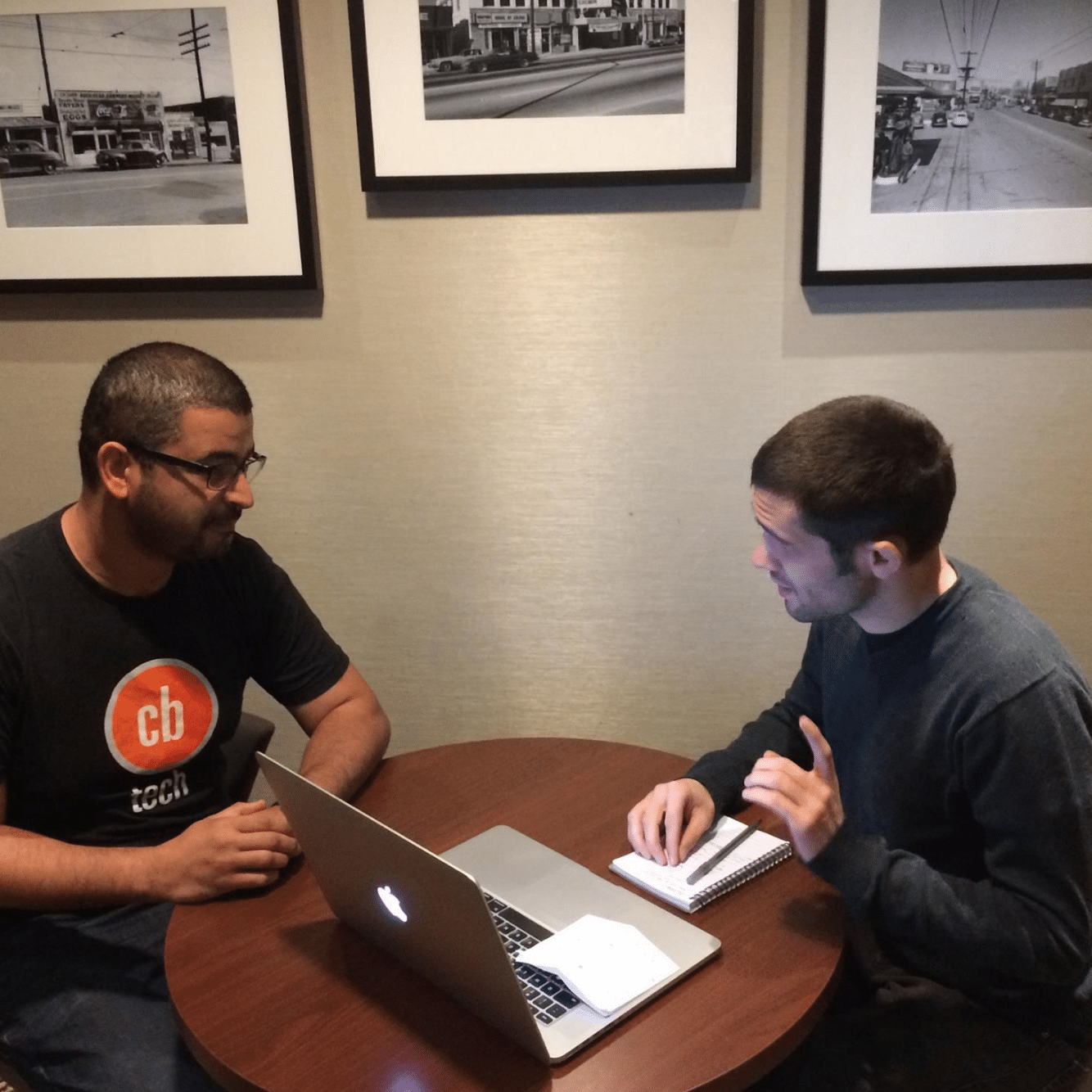
Rajkumar Bondugula, Principal Data Scientist, Equifax:
We will now have many people, including executives, searching for areas where AI/ML will make an impact, instead of AI/ML domain experts seeking problems for their solutions. Once the potential areas of impact are identified, organizations will see some productivity gains in short to medium terms (1-3 years).
Many advancements will be made in computer vision and natural language processing by large corporations that have a need and the means to use the technology.
Once the first wave of productivity gains are witnessed, the second and subsequent gains will be harder and fewer as the limitations of deep learning will begin to show up and the obvious areas of improvement are all already improved.
ROI of many teams will be negative and eventually, most of the teams will be disbanded.
Business Analytics programs that popped up in many universities will see decreased interest as students, especially with non engineering backgrounds, will have trouble finding good jobs (this movie was played before in bioinformatics).
Eric McCarthey, CEO at Shelty-Viking Capital Group, LLC:
“We haven’t seen much ‘black-belt’ level AI – There is a lot of loose experimentation going on… Until we can see some real case studies around AI effecting business metrics… then I’m not convinced. We’re at such an early stage to try to connect the dots on that right now.”
Many of these themes expressed by Atlanta’s AI crowd seems to be in line with what we see in most major US tech hubs, namely:
- Pros: Increased AI hype and attention (in academia and in the business sphere) leads to more sales inquiries and fundraising opportunities for AI companies, and more events and training around the topic.
- Cons: Increased AI hype and attention(in academia and in the business sphere) leads to lots of “fakers” (companies claiming to use AI, “trainers” claiming to teach AI, etc).
What was unique from this analyses was the degree to which the idea of “backlash” was addressed.
Rarely do I hear execs and professors expressing a concern that half-witted AI efforts will result in a pull away from AI, an actual decrease in funding and belief in the technology’s merits. While everyone with a genuinely robust AI background (say, a Masters degree or higher in AI or ML) is annoyed by the rife AI quackery, it is rare to hear someone from Boston or San Francisco express fear of an impending “drying up” of attention, funding, or adoption.
In hearing the arguments for this in-person during my trip, I can’t help but see the potential merits of the argument. We can imagine that this issue might be heightened in a city like Atlanta where – as expressed by Rajkumar – the AI-related talent pool is even more limited, and potentially more likely to be filled with novices.
Time will tell if the influx of attention yields blowback when the intended ROI of AI doesn’t materialize. Rajkumar mentioned a phenomena of this kind with the field of bioinformatics years ago – and it’s uncertain of AI will share a similar fate.
The Advantages of Atlanta as a Startup Hub
Will McGinnis, Chief Scientist at Predikto:
Atlanta is a great place to start a company for a lot of reasons. We have fantastic universities, a huge number of large corporations, easy flights to basically anywhere, and a low cost of living.
We’re starting to see more B2C companies here, but traditionally have been more enterprise-y. In general for startups I think you’re limited by how many customers you can talk to, so for companies selling into big corps, it’s a great place to be with good infrastructure for facilitating those conversations.
Nikolaos Vasiloglou founder of MLTrain:
Georgia Tech is definitely the core of “the hub”. Affordable housing is in my opinion the second reason.
Bay area cost of leaving is insane, you need a good exit just for the down-payment, while in Atlanta you can pay off your house in 15 years with just your salary! Traditional corporations that suffer from catching up with technology is a great opportunity for finding clients. At last I think the airport plays a significant role. There are direct flights to almost every place on the planet.
Ashok Goel, Professor, Georgia Tech:
Atlanta is a booming city, with a young and skilled population, and a cosmopolitan culture. It has several major universities that are a constant source of new talent. NCR recently moved its headquarters to be adjacent to Georgia Tech. I hope Amazon builds its second headquarters in Atlanta.
Larry Lafferty, President and CEO of Veloxiti, Inc.:
Atlanta has a deep software engineering talent pool due to universities such as Georgia Tech, Clemson University, University of Georgia, and others.
Corbett Gilliam, Corporate Development Manager, ATDC:
Atlanta is a growing city with many Fortune 500 and Fortune 1000 companies, and plenty of talent is moving to the city to follow these jobs. The cheap standard of living coupled with an abundance of talent moving here will continue to grow Atlanta as the startup hub of the South.
Khalifeh AlJadda, Lead Data Scientist at CareerBuilder:
Great location which enable startups to do business with clients in different states. Real estate is very affordable. Great local schools to recruit talents. Nice weather most of the year. Very active and connected Tech community.
Tracy Moore, COO Argus AI Systems:
Talent, cost of living, culture (Atlanta is a friendly place – people want to help others succeed), business friendly legislature, Hartsfield International Airport.
Recently, Forbes named Atlanta one of 5 U.S. Cities Poised to Become Tomorrow’s Tech Meccas as mentioned in this article.
Rajkumar Bondugula, Principal Data Scientist, Equifax:
Atlanta has large corporations that could can take advantage of AI/ML talent/start up products to gain productivity improvements both from cost cutting and from new revenue generation.
Second, since the cost of living is reasonable, new products can be generated with reasonable cost (i.e., companies have much longer runways than a typical California company for same money). Plenty of engineering talent (not necessarily AI/ML talent) from existing corporations can be attracted to work in the startups.
Over and over again there is an emphasis on cost of living and the value of Atlanta’s airport – both of which are hard to deny.
The Atlanta’s Hartsfield–Jackson Atlanta International Airport handles an unbelievable 100,000,000+ people per year, with direct routes to locations all over the world. This makes Atlanta a convenient home for some military personnel, but we might imagine that this also provides a significant convenience for international businesses – or companies with very mobile sales forces.

The cost of living in Atlanta is absolutely to die for when compared with SF, NYC, or Boston. The following comparisons are from Numbeo:
- You would need around 4,632.24$ in Atlanta, GA to maintain the same standard of life that you can have with 6,100.00$ in Boston, MA
- 76% the cost of living in Boston
- You would need around 4,635.42$ in Atlanta, GA to maintain the same standard of life that you can have with 7,700.00$ in New York, NY
- 60% the cost of living in NYC
- You would need around 7,905.92$ in San Francisco, CA to maintain the same standard of life that you can have with 4,700.00$ in Atlanta, GA
- 60% the cost of living in SF
The numbers above do little justice to the real estate situation in Atlanta, where home ownership is viable on nearly any salary – as Nikolaos aptly mentions.
The value of Atlanta’s academic prowess is harder to justify in comparison with other tech hubs like Boston, New York, or San Francisco – which not only have an astronomically higher number of universities but also lay claim to more prestigious institutions.
This, of course, isn’t taking anything away from Atlanta’s own academic hubs – namely Georgia Tech. It doesn’t, however, put them on par with other hubs.
The existing business ecosystem in Atlanta does in fact provide B2B firms with a wide array of potential customers, but it isn’t clear if that’s any different (or better) from any other city of similar size.
Though it isn’t something that many folks addressed during my visit, I was personally taken aback by the trees everywhere in the city. Wikipedia states: “With 36% of the city covered in trees, Atlanta is more densely forested than other cities in the U.S., which average only 27% coverage.”
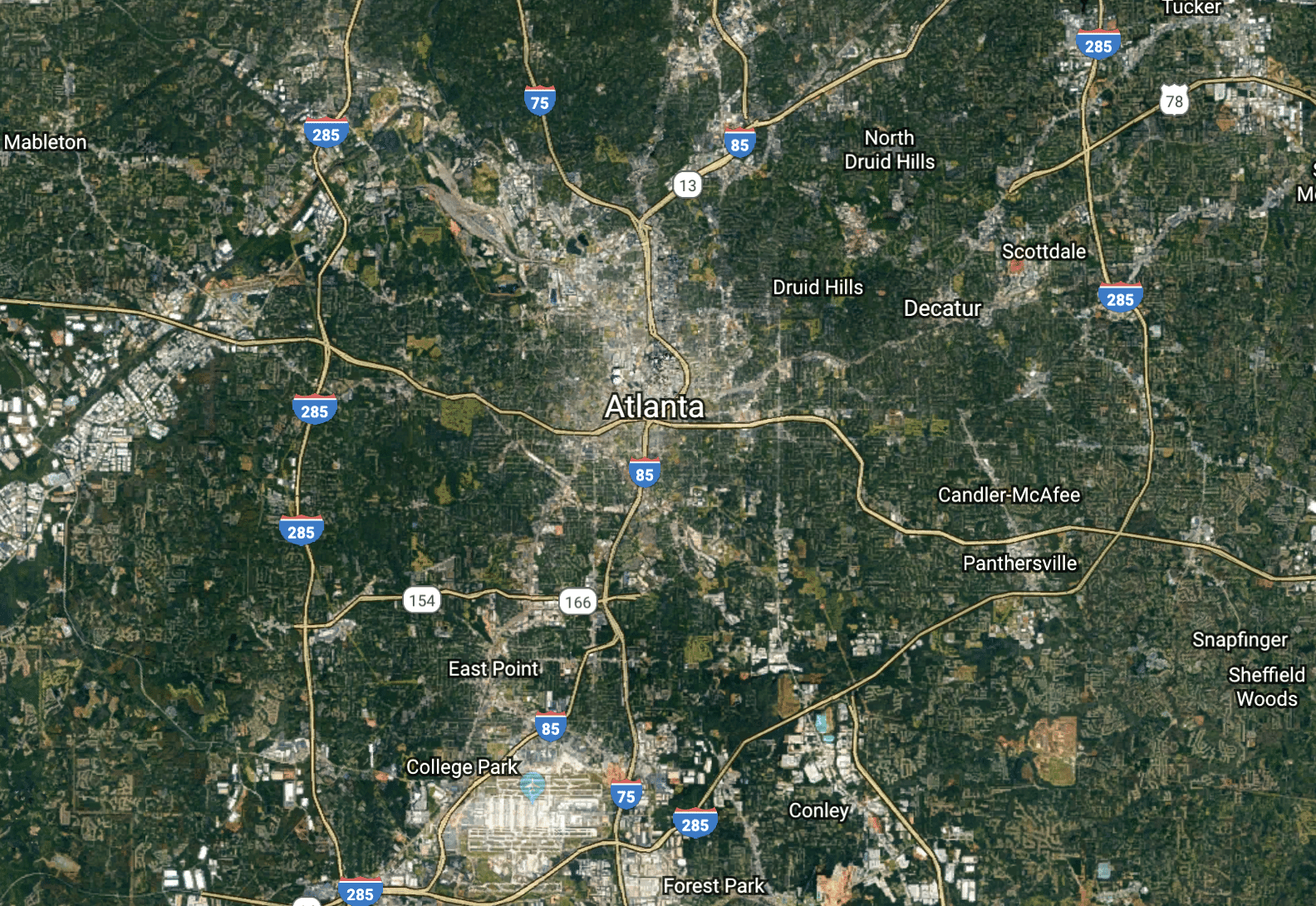
I found the forests to be refreshing.
The Disadvantages of Atlanta as a Startup Hub
Will McGinnis, Chief Scientist at Predikto:
We haven’t had the concentration of B2C companies that some other hubs have. That’s hopefully changing with things like Switchyards. Access to capital is improving but not in the league of SF, NYC or Boston. I’d still rather get on a plane to talk to a VC than to talk to a customer though.
Nikolaos Vasiloglou founder of MLTrain:
Political conservatism, that leads to poor decisions about education and discrimination. We have a lot of hardcore republicans that supported the current President who is a red flag for technologists.
The recent incident with Delta withdrawing discounts from NRA and the running governor threatening to suspend tax breaks is an example. If you drive 40 miles away from Georgia Tech which is the center of innovation you feel you live in 1800 in terms of political views and attitude. Another problem is lack of experienced VC capital.
Ashok Goel, Professor, Georgia Tech:
Perhaps traffic as in any major city?
Larry Lafferty, President and CEO of Veloxiti, Inc.:
Though certainly not impossible, raising money for a startup is more difficult in Atlanta than in other regions.
Khalifeh AlJadda, Lead Data Scientist at CareerBuilder:
Traffic and Public transportation.
Corbett Gilliam, Corporate Development Manager, ATDC:
From the entrepreneur’s perspective, venture capital is currently expensive in Atlanta. Due to the high demand for VC’s, we are noticing entrepreneurs taking on less funding for more equity than they typically will out west.
Tracy Moore, COO Argus AI Systems.:
Conservative investors, limited venture capital.
Rajkumar Bondugula, Principal Data Scientist, Equifax:
The universities here do not have strong AI programs nor host many AI researchers. Many analytics (Ex: Georgia Tech, Kennesaw State University) programs are simply redressed statistics programs that do not produce usable AI talent.
So, true AI talent has to be hired from elsewhere and the true AI talent that gets generated here is scooped by large (true) technology companies (Ex: Facebook, Microsoft etc.).
If the Boston crowd sometimes feels left behind in terms of VC funding, they should look to Atlanta. Below is a map of 2016 venture investments by city:
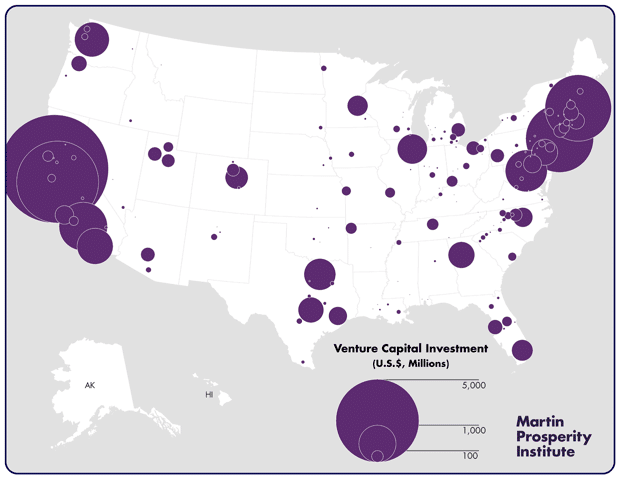
A troubling state of affairs for funding, indeed.
While traffic in Atlanta is probably hectic, it doesn’t compare to the nonsense that Bay Area folks (or many NYC folks) endure on a daily basis. Atlanta is a rather spread out city, however, and owning a car is downright necessary for anyone who doesn’t live in Atlanta proper.
The Influence of Atlanta’s Local Culture on its Startup Ecosystem
Will McGinnis, Chief Scientist at Predikto:
We have a strong influence from the universities here that drives a lot of hard tech and research. We’re a scrappy, diverse, civic-minded city, and I think that’s reflected a lot in our startup scene. We’ve got a chip on our shoulder.
Nikolaos Vasiloglou founder of MLTrain:
Atlanta is a growing city which aspires to be like New York. Combines urban and city life. This is really important because you can start your career living in a nice new modern apartment and as your life progresses you move a few miles a way to house with your family.
Contrast this to NY where once you have kids you have to move to New Jersey and spend half of your life commuting. Also high rises in Atlanta are modern with a lot of amenities and much cheaper compared to NY. Same story with bay area. And even if you really adore NY, there are 30 flights every day from Atlanta airport. In short in Atlanta you don’t have to sacrifice your life quality to work for a startup.
Khalifeh Al Jadda, Lead Data Scientist at CareerBuilder:
Diversity and hospitality. You feel that when you live in Atlanta, people accept you regardless of your color, religion, origin, language,..etc. Also, in Atlanta you enjoy the southern hospitality which you feel when go to any hotel or restaurant.
That for sure weave its way into business where you find in Atlanta companies diversity is always encouraged and hospitality is something companies compete to implement.
Tracy Moore, COO Argus AI Systems:
Absolutely. Great peer to peer networking. Business leaders genuinely want to see other Atlanta based businesses succeed.
Without a doubt, the southern hospitality is strong in Atlanta. Greetings, smiles, and handshakes certainly seem like more of a norm in Atlanta than Mountain View or Manhattan.
I’ve never been in a room talking about artificial intelligence, and at the same time having side conversations about firearms. Culturally it’s unlike any tech city I’ve ever been in.
Industries and Technologies Where Atlanta is Strong
Will McGinnis, Chief Scientist at Predikto:
We’ve got a great concentration of cybersecurity companies, some with huge exits like ISS. We’ve got the best freemium SaaS company around in Mailchimp.
We’ve got a good and growing group of logistics / heavy industry / transportation companies. If you sell software, especially SaaS, into the fortune 500, you should probably be in Atlanta.
Nikolaos Vasiloglou founder of MLTrain:
Banking, Consulting and Law firms have big presence in Atlanta. Also the airport fuels the city!!
Tracy Moore, COO Argus AI Systems:
Yes. Financial technology, cybersecurity, Healthcare IT
Eric McCarthey, CEO at Shelty-Viking Capital Group, LLC:
“The three big business sectors that are talking about the long-range disruption are fintech, healthcare IT, and martech… I’m seeing a lot of discussions and write-ups in the press in general around those three major sectors and how AI is going to impact them.”
I heard healthcare and fintech brought up time and time again during my Atlanta trip. I heard that the ecosystems for those industries were strong in Atlanta. Oddly enough, with the exception of First Data (a global leader in commerce-enabling technology), the Fortune 500 companies based in the city don’t seem to relate to these sectors at all:
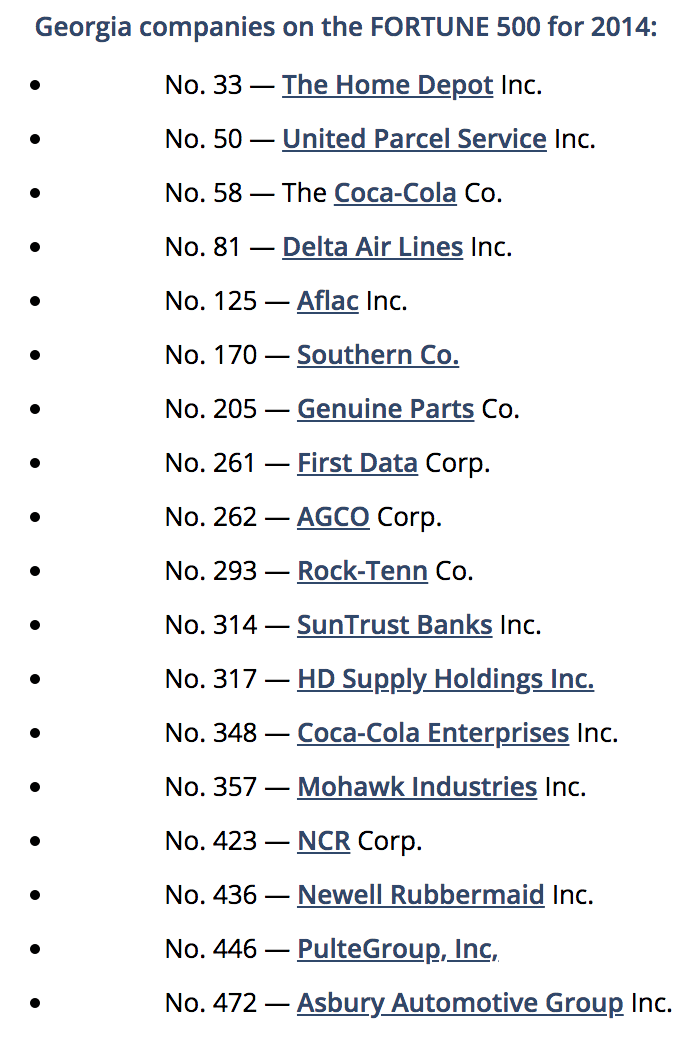
Delta and UPS make sense given Atlanta’s prominence for air transportation.
Conclusion and Special Thanks
This article wouldn’t have been possible without the ideas and contributions of artificial intelligence experts around Atlanta, including many experts who weren’t quoted in this piece directly. I’ve listed these folks below, including links to their interview on the AI in Industry podcast (if such an interview is published):
- Eric McCarthey, CEO at Shelty-Viking Capital Group, LLC
- Will McGinnis, Chief Scientist at Predikto
- Nikolaos Vasiloglou founder of MLTrain
- Ashok Goel, Professor, Georgia Tech
- Tracy Moore and Bob Wright of Argus AI Systems
- Larry Lafferty, President and CEO of Veloxiti, Inc.
- Khalifeh AlJadda, Lead Data Scientist at CareerBuilder
- Rajkumar Bondugula, Principal Data Scientist, Equifax
- John-Paul Clarke, Chief Scientist at Pace, and Professor at Georgia Tech
- Dr. Bob Baxley, Chief Engineer at Bastille
- Dr. Charles Isbell is Senior Associate Dean at Georgia Tech
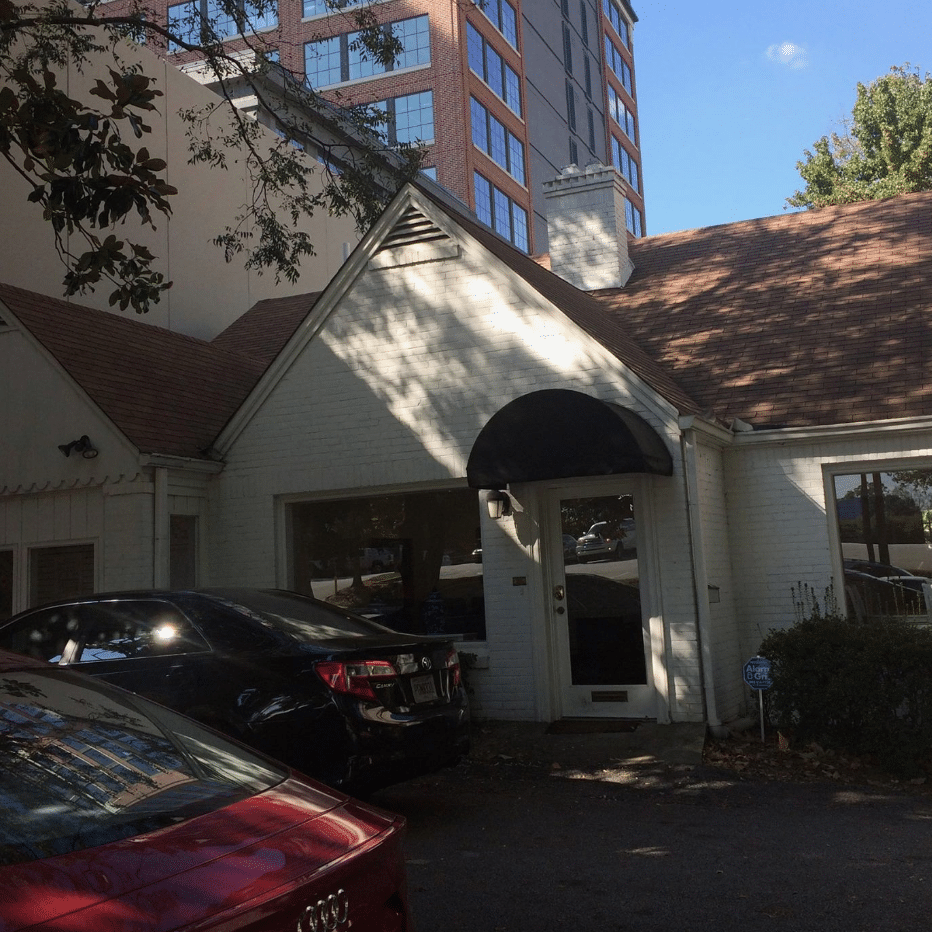
I’d like to give a special thanks to Bob Wright of Argus AI Systems for reaching out to have me speak in Atlanta.
Bob is a long time listener to the Emerj “AI in Industry” podcast, and it was his idea and initiative to line up over a dozen interviews with Atlanta’s AI execs and researchers – which is what prompted me to put together this article.
Bob and his partner in Argus AI Systems, Tracy Moore – were among the kindest hosts I’ve ever had in my years of traveling and speaking, and I wanted to be sure to give them a special thanks.
“Southern hospitality” is alive and well in Atlanta, and maybe the AI ecosystem as a whole could use a bit of that.
Header image credit: Frontier Airlines







